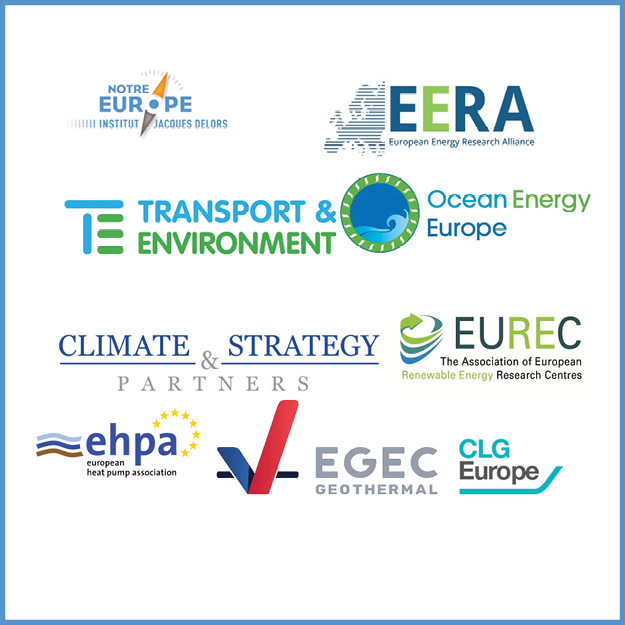Pour aider à lutter contre le changement climatique, nous soutenons l’augmentation du budget de recherche et d’innovation d’Horizon Europe

Institut Jacques Delors • Jacques Delors Energy Center • European Energy Research Alliance • Climate Strategy and Partners • Energy Efficiency Capital Advisors • Association of European Renewable Energy Research Centres • European Federation for Transport and Environment • Ocean Energy • European Heat Pump Association • European Geothermal Energy Council • Corporate Leaders Group Europe
Mr Frans Timmermans
First Vice-President, European Commission
Executive Vice-President-designate for the Green Deal Rue de la Loi/Westraat 200
1049 Brussels
BELGIUM
Ms Mariya Gabriel
European Commissioner for Digital Economy and Society
European Commissioner-designate for Innovation & Youth
Rue de la Loi/Westraat 200
1049 Brussels
BELGIUM
24 September 2019
Dear First Vice-President Timmermans and Commissioner Gabriel:
We are excited the European Commission is bringing together so many different stakeholders this week in Brussels to help shape the future of research and innovation (R&I) policy. As organisations representing diverse interests and perspectives across Europe, we each understand, in our own way, how research and innovation profoundly benefits both our climate and our economy.
During her Parliamentary hearing, European Commission President-elect Ursula von der Leyen outlined a vision of a Europe which by 2050 would be the world’s first climate-neutral continent.[1] She has said one of the ways to ensure we can achieve this is through investing “record amounts in cutting-edge research and innovation.”[2]
We agree with the President-elect, and we stand with her in this crucial effort – both in the final weeks of the current Commission, and in the years ahead. After all, we must invest now to secure the future we want for our children and grandchildren.
In order to help researchers, innovators and entrepreneurs generate fresh ideas, develop breakthrough technologies and create new business models, we are calling upon the European Union to increase R&I funding in the Horizon Europe budget to at least €120 billion, and to ensure a significant share of the budget is directed toward putting Europe on track to reach the Paris Agreement goals.
Only by increasing investments in research and innovation can Europe achieve climate neutrality by 2050, create good jobs and strengthen the continent’s economic power and influence around the world.[3]
We also call upon the European Commission to boost lab-to-market programmes that can help European companies rapidly commercialise their clean technologies, and to make R&I an integral part of the European Green Deal.
Only by designing public programmes that leverage private-sector investments can Europe establish itself as the world’s leading exporter of technologies, knowledge and best practices.
Here are two examples of how more R&I funding helps us fight climate change while also expanding our economy:
- To reach the objective of climate neutrality and meet the goals of the Paris Agreement, we need both deployment and innovation. We have at our disposal many of the solutions necessary to build Europe’s clean energy future, including renewable energy, energy storage, energy efficiency zero-emission vehicles and circular economy, to name a few. However, in order to deploy the most cutting-edge solutions across Europe and around the world at the rapid speed required to prevent climate change’s most dire consequences, we need more R&I investment now. Securing adequate funding levels for R&I is one of the most effective, cost-efficient tools the EU has available to support the creation of the kinds of breakthrough solutions and technologies necessary to achieve climate neutrality.[4]
- More R&I funding increases Europe’s economic competitiveness, especially for SMEs. Europe lags its global rivals in research and development expenditure as a percentage of GDP.[5] In 2016, the EU spent about 2 percent of its GDP on R&D. That’s about 35 percent less than Japan, 26 percent less than the U.S. and nearly 4 percent less than China. By scaling up R&I funding, we increase Europe’s economic competitiveness and productivity; create new markets, industries and jobs; and support SMEs and others so they can take new ideas from universities, labs and board rooms to global commercial markets. Between 2021 and 2027, every €1 invested in Horizon Europe could generate a return of €10-11 of GDP gain.[6]
European businesses, governments and citizens have already made our economy more prosperous while also making it more environmentally sustainable. But to deliver climate neutrality by 2050, we have a long way to go. Our organisations – with a combined membership base representing 300 corporate and non-profit organisations and 290 research institutes in more than 30 countries – are ready to help Europe meet the challenge.
We look forward to working with the European Commission on the development of a properly designed, fully funded Horizon Europe programme, which can support a European Green Deal and put Europe on the path to climate neutrality. We stand ready to discuss our positions with you and others at any point.
Sincerely,
Pascal Lamy, President emeritus of the Jacques Delors Institute
Geneviève Pons, Director of the Brussels office of the Jacques Delors Institute
Adel El Gammal, Secretary General of EERA
Peter Sweatman, CEO of Climate Strategy and Partners
Paola Mazzucchelli, Secretary General of EUREC
William Todts, Executive Director of Transport & Environment
Rémi Gruet, CEO of Ocean Energy
Thomas Nowak, Secretary General of EHPA
Philippe Dumas, Secretary General of EGEC
Eliot Whittington, Director of CLG Europe
cc Mr Carlos Moedas
Ms Sylvie Goulard
Mr Virginijus Sinkevičius
Ms Stella Kyriakides
Mr Vladis Dombrovskis
Mr Paolo Gentiloni
Ms Margrethe Vestager
[1] https://ec.europa.eu/commission/presscorner/detail/it/speech_19_4230
[2] https://ec.europa.eu/commission/sites/beta-political/files/political-guidelines-next-commission_en.pdf
[3] http://ec.europa.eu/research/evaluations/pdf/archive/other_reports_studies_and_documents/hlg_2017_report.pdf
[4] https://ec.europa.eu/info/publications/final-report-high-level-panel-european-decarbonisation-pathways-initiative_en
[5] https://data.worldbank.org/indicator/GB.XPD.RSDV.GD.ZS?end=2017&most_recent_value_desc=true&start=1996
[6] Impact Assessment Horizon Europe, European Commission. Part 2, p. 35



